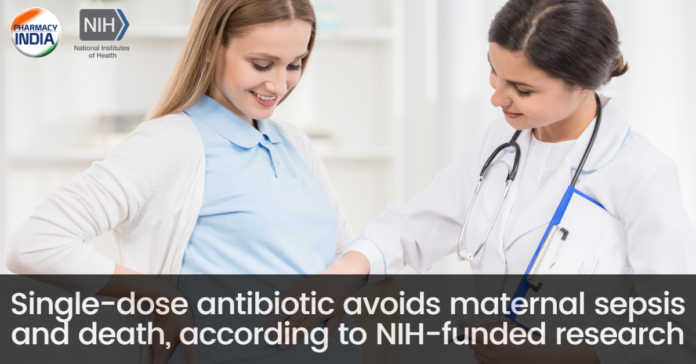According to a significant multi-country clinical trial supported by the National Institutes of Health, a single oral dose of the antibiotic azithromycin can reduce the likelihood of postpartum sepsis and death among women who give birth vaginally by one-third (NIH). Contrary to 2.4% of those who received placebo, only 1.6% of research participants who were given azithromycin during labour experienced sepsis or lost their lives within six weeks of giving birth. The risk of miscarriage, infant sepsis, or newborn death was not decreased by azithromycin.
Results from the study, which included more than 29,000 women in seven low- and middle-income nations, were presented at the Society for Maternal-Fetal Medicine’s 43rd Annual Pregnancy Meeting in San Francisco and were published today in the New England Journal of Medicine.
According to Diana W. Bianchi, M.D., director of the NIH’s Eunice Kennedy Shriver National Institute of Child Health and Human Development (NICHD), the trial’s main funder, “these findings have the potential to change clinical practise by providing a safe, effective, and low-cost approach to reduce the global burden of maternal sepsis and death.” Effective prevention methods are urgently needed because pregnancy-related infections are thought to be the cause of 10% of maternal fatalities globally. The Foundation for the National Institutes of Health, a non-profit organisation that oversees international research projects carried out through partnerships with public and private institutions in support of the NIH mission, received a grant from the Bill & Melinda Gates Foundation to co-fund the trial, known as A-PLUS. The study was carried out by the Global Network for Women’s and Children’s Health Research of the NICHD.
Sepsis, a potentially fatal side effect of bacterial and other infections, is a major global cause of maternal and newborn fatalities, particularly in low- and middle-income nations. When administered intravenously during a caesarean birth, azithromycin, a cheap antibiotic powerful against a wide range of germs, is known to lower maternal infection. Giving the oral form of the medication to women who want to give birth vaginally may lessen maternal or neonatal infection and death, according to two small studies. Women were registered in A-PLUS at NICHD Global Network locations in Bangladesh, the Democratic Republic of the Congo, Guatemala, India, Kenya, Pakistan, and Zambia after it was launched in 2020. A two-gram dose of oral azithromycin or a placebo was given to 29,278 individuals who intended to deliver vaginally between September 2020 and August 2022, at random.
In the first six weeks following delivery, sepsis or death occurred in 227 of the 14,526 participants (1.6%) who took azithromycin as opposed to 344 of the 14,637 (2.4%) who received a placebo. In both groups, fatalities were few. 219 people in the azithromycin group (1.5%) and 339 in the placebo group (2.3%) experienced sepsis. Additionally, women who received azithromycin were less likely to develop endometritis (infection of the lining of the womb) and other infections. In comparison to the placebo group, they also experienced fewer unscheduled medical visits and hospital readmissions.
We were able to quickly compile these crucial data by utilising the capabilities and knowledge of the NICHD Global Network across three continents. According to Alan T.N. Tita, M.D., Ph.D., associate dean of Global and Women’s Health at the University of Alabama at Birmingham (UAB) Marnix E. Heersink School of Medicine, “We hope that our findings will be implemented to help enhance maternity care in low- and middle-income nations around the world.
Dr. Tita and Waldemar A. Carlo, M.D., also of UAB, shared leadership of the trial. A-PLUS was a joint effort between eight U.S. academic institutions and RTI International, Research Triangle Park, North Carolina, which acts as the data coordinating centre for the NICHD Global Network. Similar numbers of stillbirths, newborn sepsis, or infant deaths within the first four weeks of life occurred in the azithromycin and placebo groups. Overall, 10.5% of births in the azithromycin group and 10.3% of births in the placebo group experienced these side events.
Up to 34,000 women could have been enrolled in A-PLUS at its inception. However, the research was terminated early based on a recommendation from the independent data and safety monitoring committee after a planned interim data review due to the apparent maternal benefit of azithromycin. The Eunice Kennedy Shriver National Institute of Child Health and Human Development (NICHD) directs research and education to comprehend human development, enrich the lives of children and adolescents, promote reproductive health, and maximise capacities for everyone.



